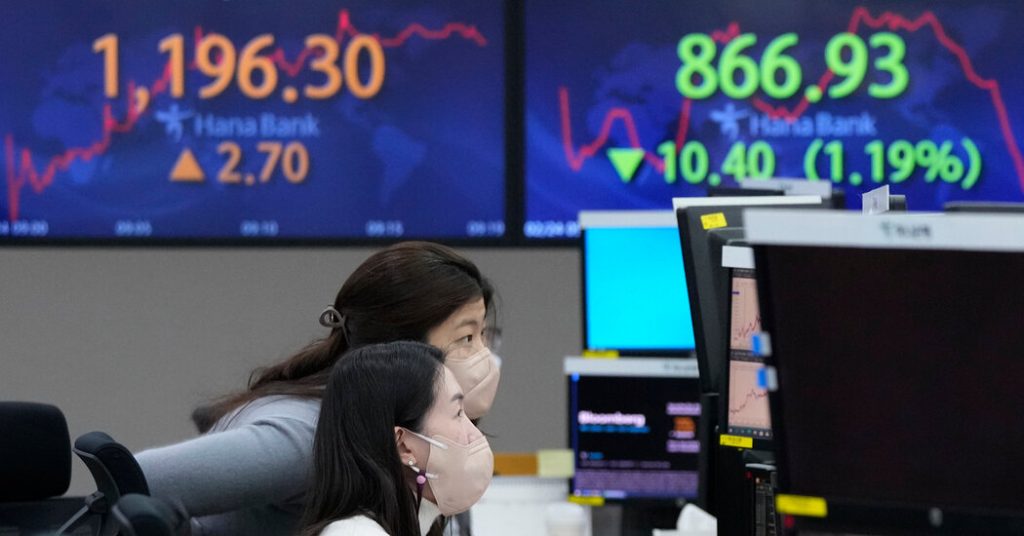
The price of oil jumped to $105 a barrel, natural gas futures in Europe rose 40 percent, and global stock indices fell on Thursday. Russia invaded Ukraineto expand the market turmoil that was driven by fears of a large-scale attack.
The impact on financial and commodity markets from Russia’s overnight attack was immediate and broad, starting with Asia, with Hong Kong’s Hang Seng losing 3.2%. In Germany, the DAX is down more than 4 percent, and the broader Stoxx Europe 600 is down about 3.5 percent. On Wall Street, the S&P 500 was down 2.5 percent in early trading.
The price of Brent crude, the global benchmark, has fallen from its highs but is still up more than 7 percent at around $104 a barrel – and is trading at its highest levels since 2014. WTI also jumped 7 percent, to around $99 a barrel. .
Gas futures contracts in the first month in the Netherlands, a European standard for natural gas, rose 40 percent to over 125 euros per megawatt hour. Russia supplies more than a third of EU gas, some of which passes through pipelines in Ukraine. A year ago, gas was sold at around 15 euros per megawatt-hour.
In Moscow, stocks collapsed and the ruble fell to a record low against the dollar. The Russian stock index MOEX fell by 42 percent. The Russian Stock Exchange briefly suspended trading earlier today.
The mood in global markets has been widely tense in recent days. The Stoxx Europe 600 reversed early gains to fall 0.3 percent on Wednesday. The S&P 500 posted a fourth consecutive day of losses, losing 1.8 percent and sliding deeper into correction territory – down more than 10 percent from a recent high. It is now 11.9 percent from its peak on January 3.
An all-out invasion could have wide-ranging effects on commodities, including oil, natural gas, wheat, and minerals. Europe is highly dependent on Russia for energy, and parts of the Middle East and Africa receive most of their wheat from Russia and Ukraine. Even if supply chains remain intact and Russian exports are not affected by the sanctions, there are concerns that Mr. Putin may punitively cut supplies.
Few of Russia’s exports go directly to the United States, but turmoil anywhere could raise prices, prolonging inflation that has already run longer than officials expected. The Federal Reserve has indicated that it is preparing to raise interest rates, with the goal of slowing inflation by slowing spending, and giving supply time to catch up. But higher rates will also dampen growth, and doing so while markets are already down risks prolonging deflation.
With more aggressive anti-Russian financial divisions in the works, bank stocks fell faster than the markets in general. Shares of European banks with the largest Russian operations fell: shares of Austria’s Raiffeisen fell 19%, while UniCredit of Italy and France’s Société Générale lost about 11% of their value.
In the US, Goldman Sachs, JPMorgan Chase and Citigroup are down about 4 percent.
US stocks have been falling for weeks, as investors worried about how quickly the Federal Reserve would raise interest rates, and the S&P 500 is now down more than 12 percent so far this year.
Technology stocks in particular have slipped away from their highs, and by Wednesday evening the tech-heavy Nasdaq Composite was 18.8 percent below its November record. On Thursday, the index fell another 3 percent, crossing a threshold indicating an even worse change in sentiment on Wall Street: a bear market, or a 20 percent drop.
Anton TroyanovskyAnd the Austin Ramsey And the Jason Karian Contribute to the preparation of reports.




More Stories
JPMorgan expects the Fed to cut its benchmark interest rate by 100 basis points this year
Shares of AI chip giant Nvidia fall despite record $30 billion in sales
Nasdaq falls as investors await Nvidia earnings